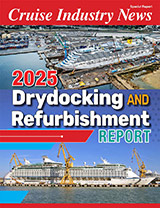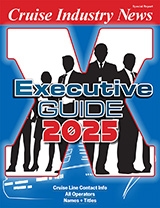“You die by selling on price alone,” said Vicki Freed, senior vice president of sales and trade support for Royal Caribbean International, who was part of a panel at the Association of Travel Marketing Executives’ 2009 Travel Industry Forecast in New York on January 26. “We have built up a brand and sell the brand (and the experience). We are heavy into television advertising.
“We want to be the brand people pay more for,” Freed added. “And if we all paid more attention to our brands, we would all be better off.”
Comparing the current situation to the aftermath of 9/11, Freed and the other panelists, which included Joanna D. Smith, senior vice president of in-flight services and global product development for Delta Airlines; Frank Camacho, staff vice president of marketing for Hertz Corporation; Mark Kazlauskas, president of Insight Vacations; Shirley Tafoya, president of Travelzoo; and Gary Sain, president and CEO of the Orlando/Orange County CVB; agreed that fear kept people from traveling then.
“Once the price went down, the fear went away,” Freed said. “People and business could not wait to travel again.
“Now it is guilt. Ninety-three percent of the population feels guilty about the 7 percent that are unemployed. Our message is that there is no better time to take a cruise. People are working hard. They are in the rat race, so they need a break. They need to get away. They need a change of scenery. Travel agents can help people relieve that feeling of guilt. On a ship, there will be 3,000 other people enjoying themselves, which will make everybody feel a lot better.”
Added Sain: “We have to make sure that people don’t expect to get 80 percent off. We have to articulate the value of our products.” He noted a Disney offer of “buy four, get three for free.”
Sain cited analysts’ comments that “it will get worse before it gets better” and that people reading into that are waiting for even better deals.
Travelzoo’s Tafoya said that special offers and low pricing drive business and also give travel companies opportunities to sell up. She cited an example whereby a time-limited special offer filled 800 room nights in a New York hotel in four days, including 30 percent from overseas.
Kazlauskas said it is the luxury end of the market that is taking the biggest hit, with people trading down, which in turn is benefiting the mass market products. “Customers are asking us what they can get the best prices on, that is, spending the least amount of money.”
Camacho agreed and said that while luxury car rentals are down, people are willing to pay more to rent hybrids. He also said that business travel is down more than leisure travel, with business cutting back and eliminating all travel that is not “absolutely necessary.”
Sain said that with 48 to 49 million visitors a year to Orlando, he was concerned about the international markets. While they only represent 6 percent of the visitors, they are responsible for 19 percent of the spending. The only bright spot, he said, are Brazil, Mexico and Canada. Hertz’s Camacho noted Latin American clients rent bigger cars, drive further and pay drop-off fees.
(For the consumer) There has never been a better time to travel, Tafoya added. “Occupancies, load factors and prices are down.” With 14 million Internet subscribers in North America, Europe and Asia, Travelzoo promises to bring them the best deals.



